Contemporary Issues in Tourism: ICT and Industry Transformation
VerifiedAdded on 2020/11/12
|14
|3583
|200
Report
AI Summary
This report examines the transformative impact of Information and Communication Technology (ICT) on the tourism industry, focusing on how technological advancements have reshaped business practices and customer experiences. It begins with a brief history of technology and its evolution, followed by an analysis of how ICT has revolutionized the tourism sector, including the role of e-tourism and digital platforms. The report critically reviews key theories such as theories of technology and the diffusion of innovation model, providing context for understanding the adoption and impact of technological changes. Key concepts like the tourism value chain and business models are discussed, with specific reference to Thomas Cook. The report evaluates the competitiveness of the tourism industry in the face of these changes, concluding with an overview of the implications of ICT. The report highlights how technology has impacted the customer journey, and the importance of ICT for both tourism businesses and travellers.
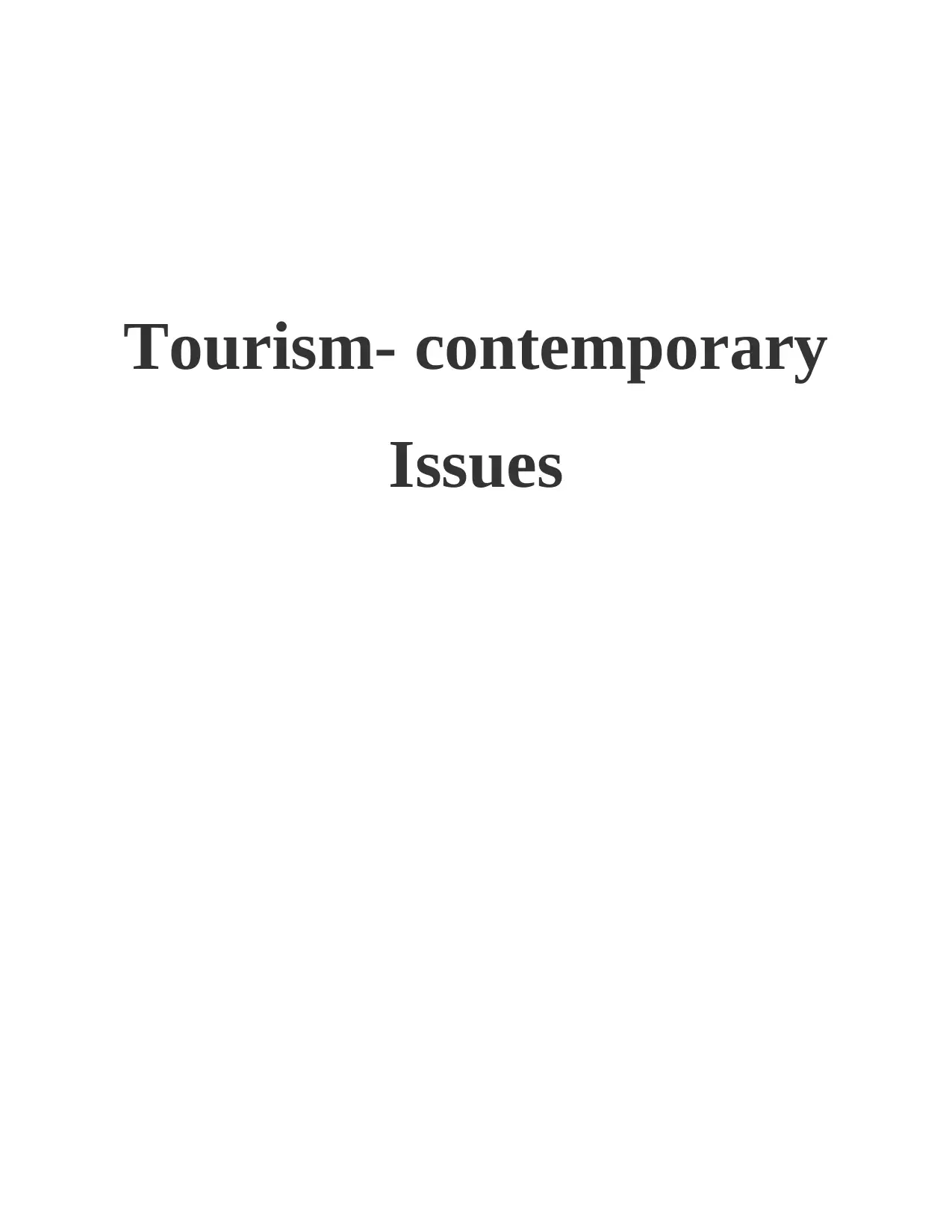
Tourism- contemporary
Issues
Issues
Paraphrase This Document
Need a fresh take? Get an instant paraphrase of this document with our AI Paraphraser
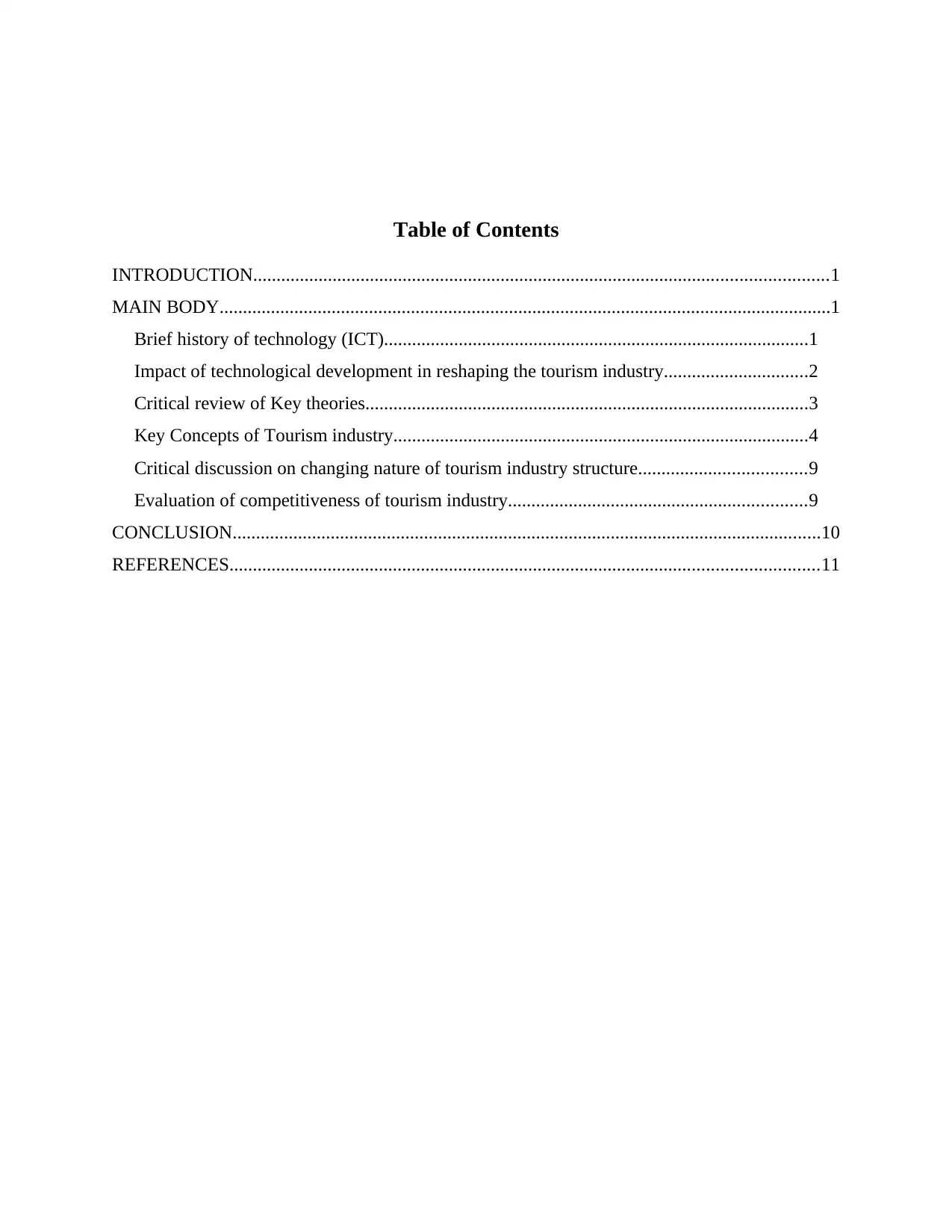
Table of Contents
INTRODUCTION...........................................................................................................................1
MAIN BODY...................................................................................................................................1
Brief history of technology (ICT)...........................................................................................1
Impact of technological development in reshaping the tourism industry...............................2
Critical review of Key theories...............................................................................................3
Key Concepts of Tourism industry.........................................................................................4
Critical discussion on changing nature of tourism industry structure....................................9
Evaluation of competitiveness of tourism industry................................................................9
CONCLUSION..............................................................................................................................10
REFERENCES..............................................................................................................................11
INTRODUCTION...........................................................................................................................1
MAIN BODY...................................................................................................................................1
Brief history of technology (ICT)...........................................................................................1
Impact of technological development in reshaping the tourism industry...............................2
Critical review of Key theories...............................................................................................3
Key Concepts of Tourism industry.........................................................................................4
Critical discussion on changing nature of tourism industry structure....................................9
Evaluation of competitiveness of tourism industry................................................................9
CONCLUSION..............................................................................................................................10
REFERENCES..............................................................................................................................11

⊘ This is a preview!⊘
Do you want full access?
Subscribe today to unlock all pages.

Trusted by 1+ million students worldwide
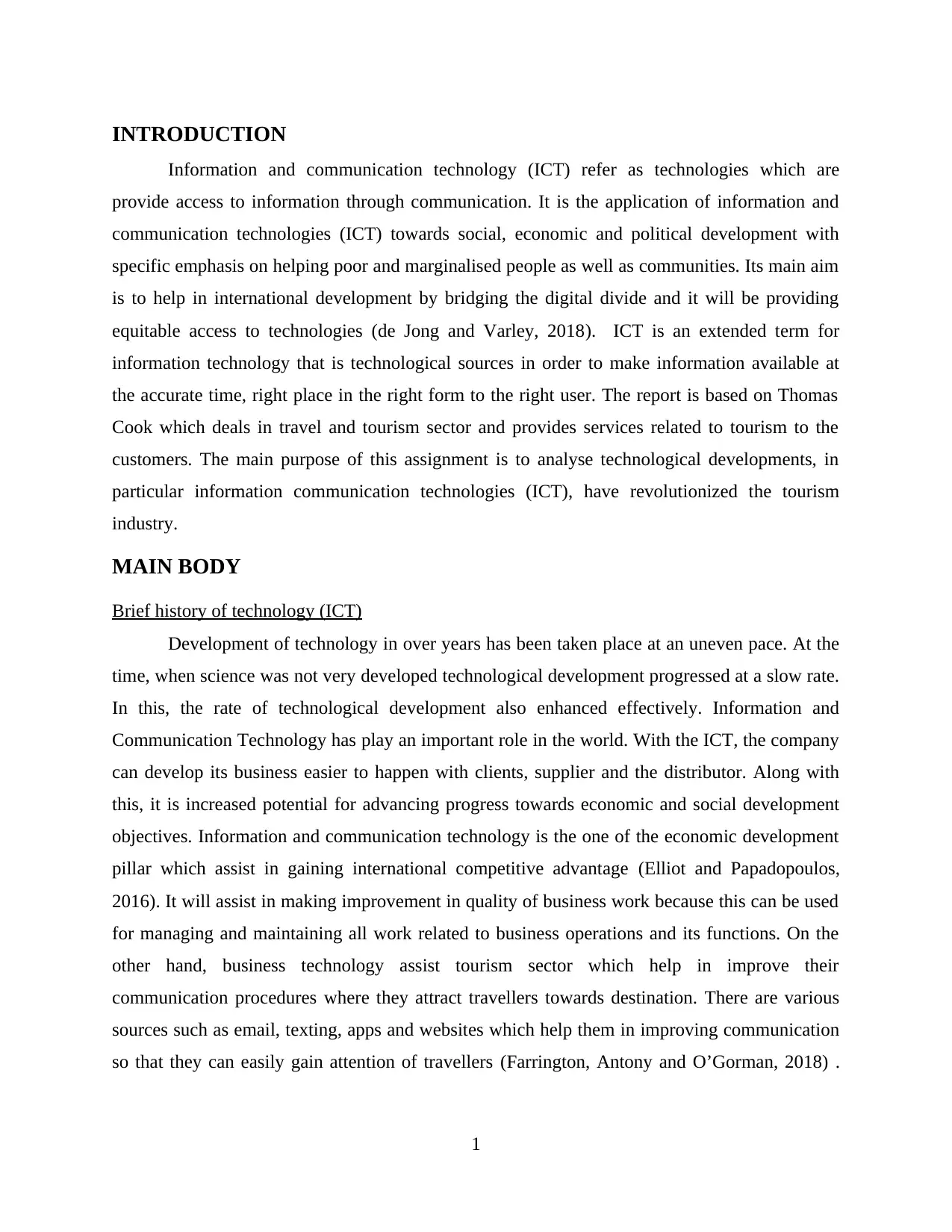
INTRODUCTION
Information and communication technology (ICT) refer as technologies which are
provide access to information through communication. It is the application of information and
communication technologies (ICT) towards social, economic and political development with
specific emphasis on helping poor and marginalised people as well as communities. Its main aim
is to help in international development by bridging the digital divide and it will be providing
equitable access to technologies (de Jong and Varley, 2018). ICT is an extended term for
information technology that is technological sources in order to make information available at
the accurate time, right place in the right form to the right user. The report is based on Thomas
Cook which deals in travel and tourism sector and provides services related to tourism to the
customers. The main purpose of this assignment is to analyse technological developments, in
particular information communication technologies (ICT), have revolutionized the tourism
industry.
MAIN BODY
Brief history of technology (ICT)
Development of technology in over years has been taken place at an uneven pace. At the
time, when science was not very developed technological development progressed at a slow rate.
In this, the rate of technological development also enhanced effectively. Information and
Communication Technology has play an important role in the world. With the ICT, the company
can develop its business easier to happen with clients, supplier and the distributor. Along with
this, it is increased potential for advancing progress towards economic and social development
objectives. Information and communication technology is the one of the economic development
pillar which assist in gaining international competitive advantage (Elliot and Papadopoulos,
2016). It will assist in making improvement in quality of business work because this can be used
for managing and maintaining all work related to business operations and its functions. On the
other hand, business technology assist tourism sector which help in improve their
communication procedures where they attract travellers towards destination. There are various
sources such as email, texting, apps and websites which help them in improving communication
so that they can easily gain attention of travellers (Farrington, Antony and O’Gorman, 2018) .
1
Information and communication technology (ICT) refer as technologies which are
provide access to information through communication. It is the application of information and
communication technologies (ICT) towards social, economic and political development with
specific emphasis on helping poor and marginalised people as well as communities. Its main aim
is to help in international development by bridging the digital divide and it will be providing
equitable access to technologies (de Jong and Varley, 2018). ICT is an extended term for
information technology that is technological sources in order to make information available at
the accurate time, right place in the right form to the right user. The report is based on Thomas
Cook which deals in travel and tourism sector and provides services related to tourism to the
customers. The main purpose of this assignment is to analyse technological developments, in
particular information communication technologies (ICT), have revolutionized the tourism
industry.
MAIN BODY
Brief history of technology (ICT)
Development of technology in over years has been taken place at an uneven pace. At the
time, when science was not very developed technological development progressed at a slow rate.
In this, the rate of technological development also enhanced effectively. Information and
Communication Technology has play an important role in the world. With the ICT, the company
can develop its business easier to happen with clients, supplier and the distributor. Along with
this, it is increased potential for advancing progress towards economic and social development
objectives. Information and communication technology is the one of the economic development
pillar which assist in gaining international competitive advantage (Elliot and Papadopoulos,
2016). It will assist in making improvement in quality of business work because this can be used
for managing and maintaining all work related to business operations and its functions. On the
other hand, business technology assist tourism sector which help in improve their
communication procedures where they attract travellers towards destination. There are various
sources such as email, texting, apps and websites which help them in improving communication
so that they can easily gain attention of travellers (Farrington, Antony and O’Gorman, 2018) .
1
Paraphrase This Document
Need a fresh take? Get an instant paraphrase of this document with our AI Paraphraser
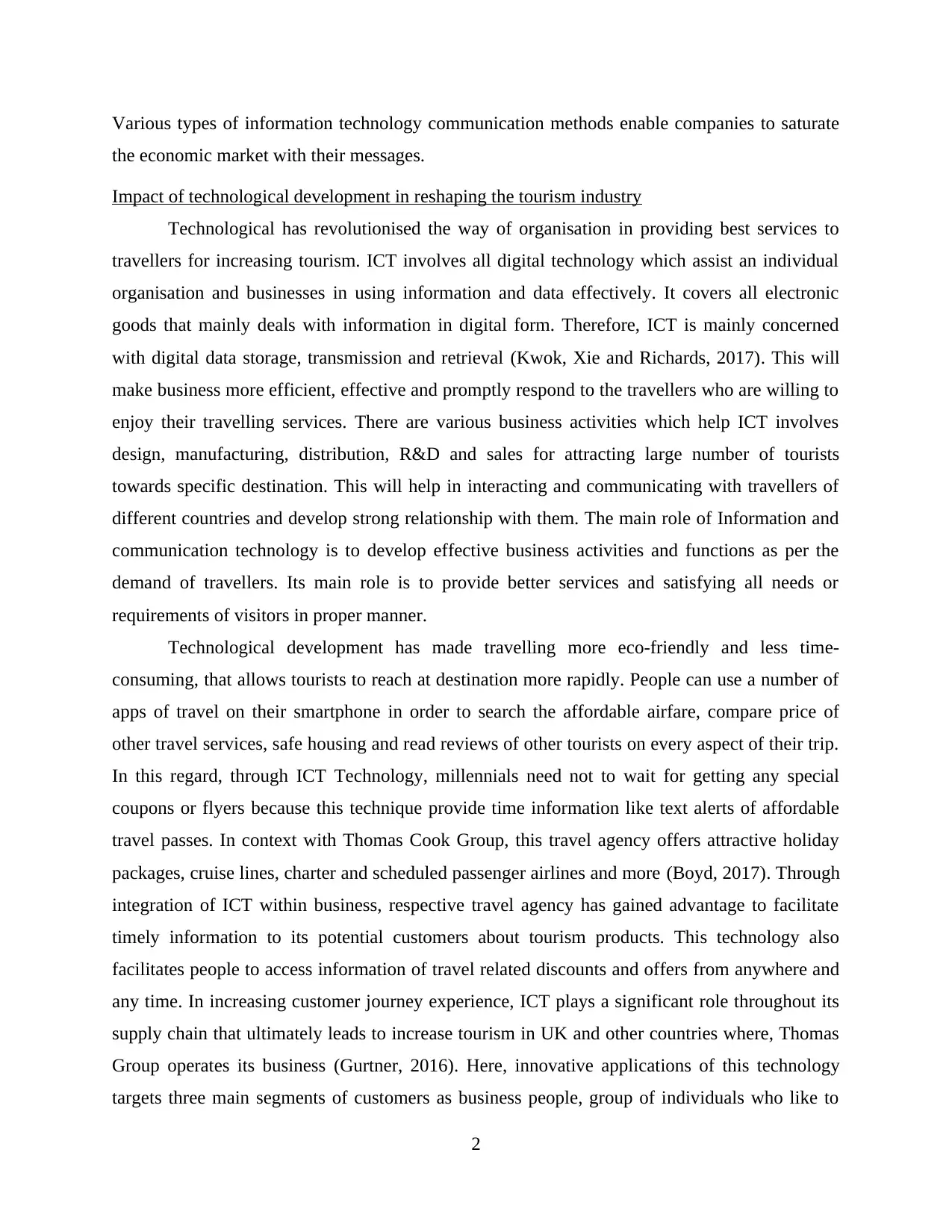
Various types of information technology communication methods enable companies to saturate
the economic market with their messages.
Impact of technological development in reshaping the tourism industry
Technological has revolutionised the way of organisation in providing best services to
travellers for increasing tourism. ICT involves all digital technology which assist an individual
organisation and businesses in using information and data effectively. It covers all electronic
goods that mainly deals with information in digital form. Therefore, ICT is mainly concerned
with digital data storage, transmission and retrieval (Kwok, Xie and Richards, 2017). This will
make business more efficient, effective and promptly respond to the travellers who are willing to
enjoy their travelling services. There are various business activities which help ICT involves
design, manufacturing, distribution, R&D and sales for attracting large number of tourists
towards specific destination. This will help in interacting and communicating with travellers of
different countries and develop strong relationship with them. The main role of Information and
communication technology is to develop effective business activities and functions as per the
demand of travellers. Its main role is to provide better services and satisfying all needs or
requirements of visitors in proper manner.
Technological development has made travelling more eco-friendly and less time-
consuming, that allows tourists to reach at destination more rapidly. People can use a number of
apps of travel on their smartphone in order to search the affordable airfare, compare price of
other travel services, safe housing and read reviews of other tourists on every aspect of their trip.
In this regard, through ICT Technology, millennials need not to wait for getting any special
coupons or flyers because this technique provide time information like text alerts of affordable
travel passes. In context with Thomas Cook Group, this travel agency offers attractive holiday
packages, cruise lines, charter and scheduled passenger airlines and more (Boyd, 2017). Through
integration of ICT within business, respective travel agency has gained advantage to facilitate
timely information to its potential customers about tourism products. This technology also
facilitates people to access information of travel related discounts and offers from anywhere and
any time. In increasing customer journey experience, ICT plays a significant role throughout its
supply chain that ultimately leads to increase tourism in UK and other countries where, Thomas
Group operates its business (Gurtner, 2016). Here, innovative applications of this technology
targets three main segments of customers as business people, group of individuals who like to
2
the economic market with their messages.
Impact of technological development in reshaping the tourism industry
Technological has revolutionised the way of organisation in providing best services to
travellers for increasing tourism. ICT involves all digital technology which assist an individual
organisation and businesses in using information and data effectively. It covers all electronic
goods that mainly deals with information in digital form. Therefore, ICT is mainly concerned
with digital data storage, transmission and retrieval (Kwok, Xie and Richards, 2017). This will
make business more efficient, effective and promptly respond to the travellers who are willing to
enjoy their travelling services. There are various business activities which help ICT involves
design, manufacturing, distribution, R&D and sales for attracting large number of tourists
towards specific destination. This will help in interacting and communicating with travellers of
different countries and develop strong relationship with them. The main role of Information and
communication technology is to develop effective business activities and functions as per the
demand of travellers. Its main role is to provide better services and satisfying all needs or
requirements of visitors in proper manner.
Technological development has made travelling more eco-friendly and less time-
consuming, that allows tourists to reach at destination more rapidly. People can use a number of
apps of travel on their smartphone in order to search the affordable airfare, compare price of
other travel services, safe housing and read reviews of other tourists on every aspect of their trip.
In this regard, through ICT Technology, millennials need not to wait for getting any special
coupons or flyers because this technique provide time information like text alerts of affordable
travel passes. In context with Thomas Cook Group, this travel agency offers attractive holiday
packages, cruise lines, charter and scheduled passenger airlines and more (Boyd, 2017). Through
integration of ICT within business, respective travel agency has gained advantage to facilitate
timely information to its potential customers about tourism products. This technology also
facilitates people to access information of travel related discounts and offers from anywhere and
any time. In increasing customer journey experience, ICT plays a significant role throughout its
supply chain that ultimately leads to increase tourism in UK and other countries where, Thomas
Group operates its business (Gurtner, 2016). Here, innovative applications of this technology
targets three main segments of customers as business people, group of individuals who like to
2
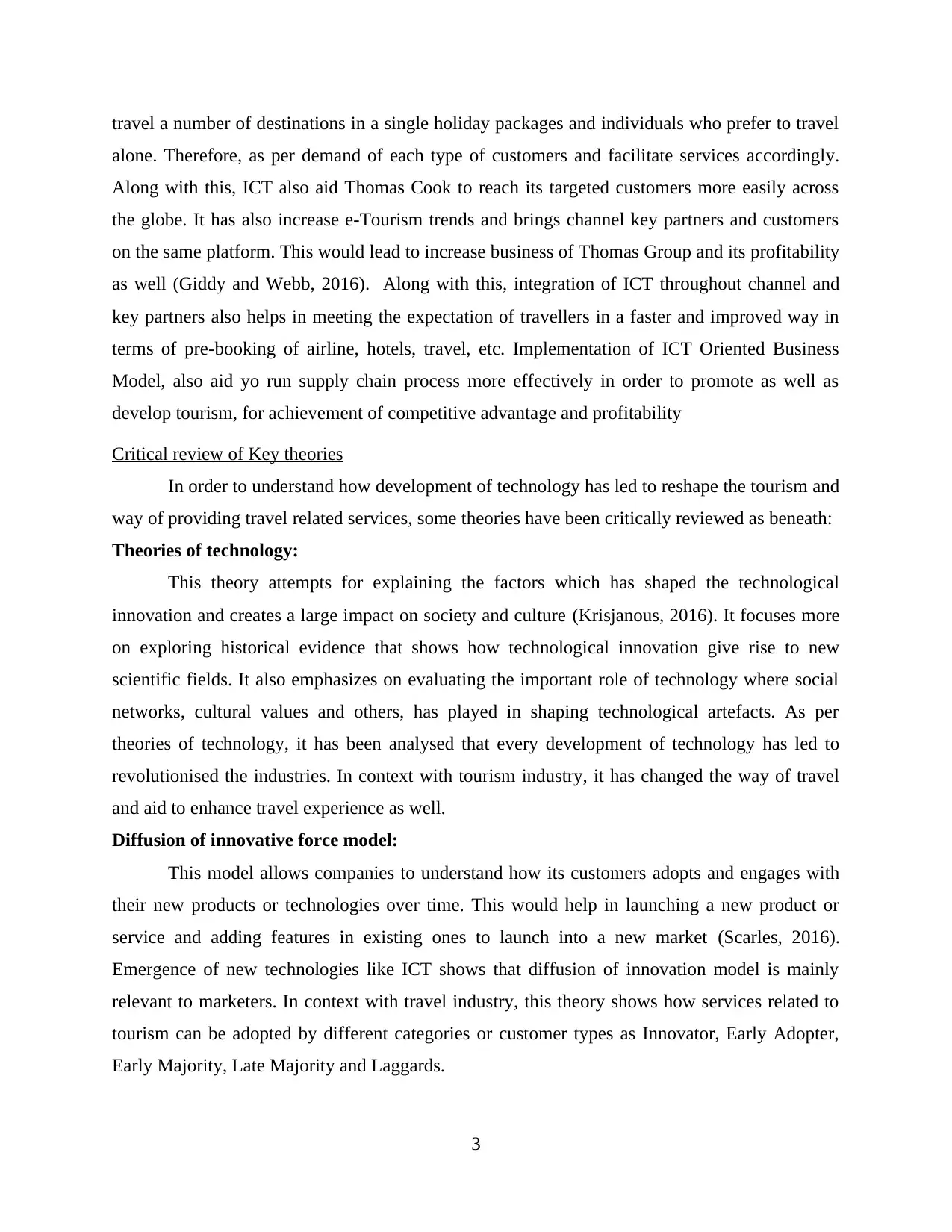
travel a number of destinations in a single holiday packages and individuals who prefer to travel
alone. Therefore, as per demand of each type of customers and facilitate services accordingly.
Along with this, ICT also aid Thomas Cook to reach its targeted customers more easily across
the globe. It has also increase e-Tourism trends and brings channel key partners and customers
on the same platform. This would lead to increase business of Thomas Group and its profitability
as well (Giddy and Webb, 2016). Along with this, integration of ICT throughout channel and
key partners also helps in meeting the expectation of travellers in a faster and improved way in
terms of pre-booking of airline, hotels, travel, etc. Implementation of ICT Oriented Business
Model, also aid yo run supply chain process more effectively in order to promote as well as
develop tourism, for achievement of competitive advantage and profitability
Critical review of Key theories
In order to understand how development of technology has led to reshape the tourism and
way of providing travel related services, some theories have been critically reviewed as beneath:
Theories of technology:
This theory attempts for explaining the factors which has shaped the technological
innovation and creates a large impact on society and culture (Krisjanous, 2016). It focuses more
on exploring historical evidence that shows how technological innovation give rise to new
scientific fields. It also emphasizes on evaluating the important role of technology where social
networks, cultural values and others, has played in shaping technological artefacts. As per
theories of technology, it has been analysed that every development of technology has led to
revolutionised the industries. In context with tourism industry, it has changed the way of travel
and aid to enhance travel experience as well.
Diffusion of innovative force model:
This model allows companies to understand how its customers adopts and engages with
their new products or technologies over time. This would help in launching a new product or
service and adding features in existing ones to launch into a new market (Scarles, 2016).
Emergence of new technologies like ICT shows that diffusion of innovation model is mainly
relevant to marketers. In context with travel industry, this theory shows how services related to
tourism can be adopted by different categories or customer types as Innovator, Early Adopter,
Early Majority, Late Majority and Laggards.
3
alone. Therefore, as per demand of each type of customers and facilitate services accordingly.
Along with this, ICT also aid Thomas Cook to reach its targeted customers more easily across
the globe. It has also increase e-Tourism trends and brings channel key partners and customers
on the same platform. This would lead to increase business of Thomas Group and its profitability
as well (Giddy and Webb, 2016). Along with this, integration of ICT throughout channel and
key partners also helps in meeting the expectation of travellers in a faster and improved way in
terms of pre-booking of airline, hotels, travel, etc. Implementation of ICT Oriented Business
Model, also aid yo run supply chain process more effectively in order to promote as well as
develop tourism, for achievement of competitive advantage and profitability
Critical review of Key theories
In order to understand how development of technology has led to reshape the tourism and
way of providing travel related services, some theories have been critically reviewed as beneath:
Theories of technology:
This theory attempts for explaining the factors which has shaped the technological
innovation and creates a large impact on society and culture (Krisjanous, 2016). It focuses more
on exploring historical evidence that shows how technological innovation give rise to new
scientific fields. It also emphasizes on evaluating the important role of technology where social
networks, cultural values and others, has played in shaping technological artefacts. As per
theories of technology, it has been analysed that every development of technology has led to
revolutionised the industries. In context with tourism industry, it has changed the way of travel
and aid to enhance travel experience as well.
Diffusion of innovative force model:
This model allows companies to understand how its customers adopts and engages with
their new products or technologies over time. This would help in launching a new product or
service and adding features in existing ones to launch into a new market (Scarles, 2016).
Emergence of new technologies like ICT shows that diffusion of innovation model is mainly
relevant to marketers. In context with travel industry, this theory shows how services related to
tourism can be adopted by different categories or customer types as Innovator, Early Adopter,
Early Majority, Late Majority and Laggards.
3
⊘ This is a preview!⊘
Do you want full access?
Subscribe today to unlock all pages.

Trusted by 1+ million students worldwide
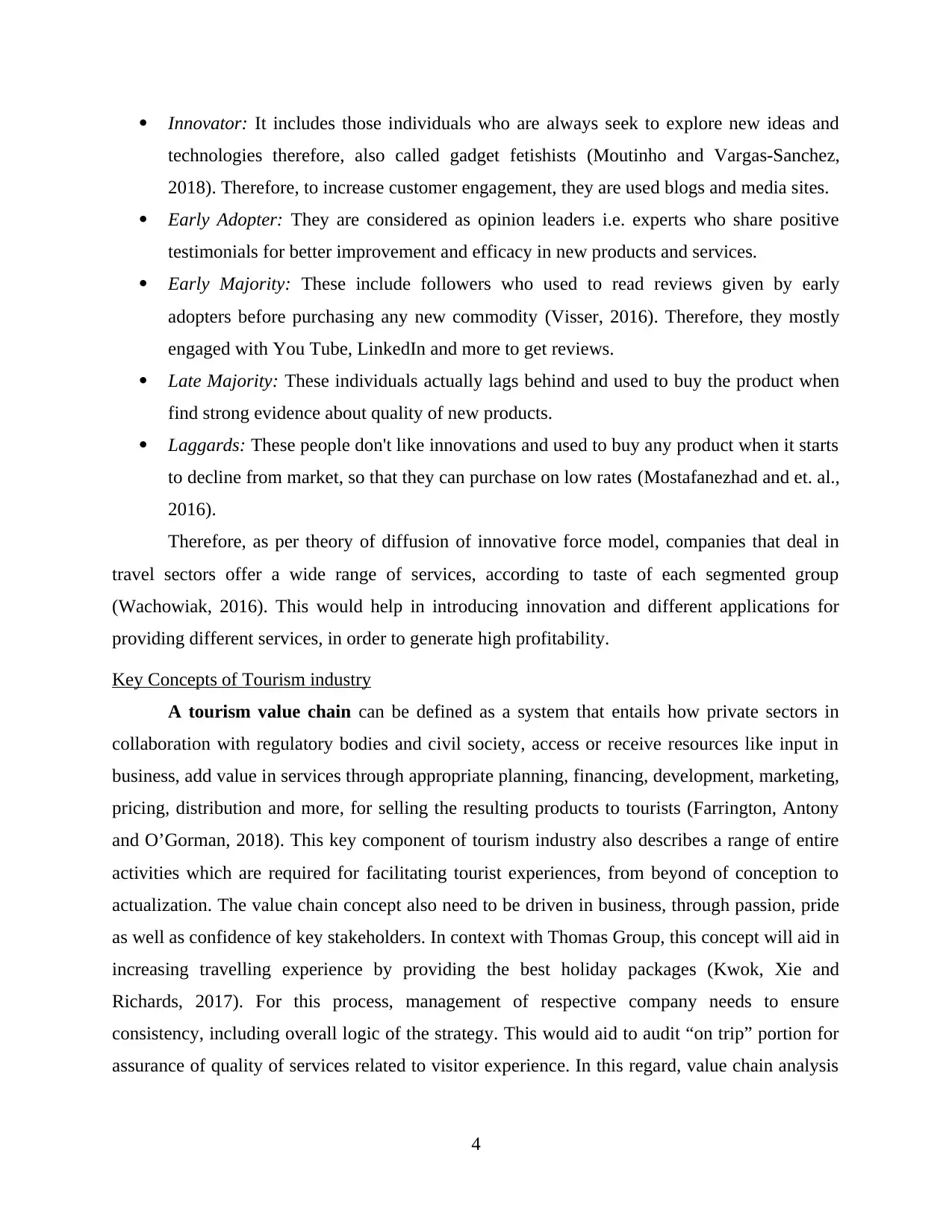
Innovator: It includes those individuals who are always seek to explore new ideas and
technologies therefore, also called gadget fetishists (Moutinho and Vargas-Sanchez,
2018). Therefore, to increase customer engagement, they are used blogs and media sites.
Early Adopter: They are considered as opinion leaders i.e. experts who share positive
testimonials for better improvement and efficacy in new products and services.
Early Majority: These include followers who used to read reviews given by early
adopters before purchasing any new commodity (Visser, 2016). Therefore, they mostly
engaged with You Tube, LinkedIn and more to get reviews.
Late Majority: These individuals actually lags behind and used to buy the product when
find strong evidence about quality of new products.
Laggards: These people don't like innovations and used to buy any product when it starts
to decline from market, so that they can purchase on low rates (Mostafanezhad and et. al.,
2016).
Therefore, as per theory of diffusion of innovative force model, companies that deal in
travel sectors offer a wide range of services, according to taste of each segmented group
(Wachowiak, 2016). This would help in introducing innovation and different applications for
providing different services, in order to generate high profitability.
Key Concepts of Tourism industry
A tourism value chain can be defined as a system that entails how private sectors in
collaboration with regulatory bodies and civil society, access or receive resources like input in
business, add value in services through appropriate planning, financing, development, marketing,
pricing, distribution and more, for selling the resulting products to tourists (Farrington, Antony
and O’Gorman, 2018). This key component of tourism industry also describes a range of entire
activities which are required for facilitating tourist experiences, from beyond of conception to
actualization. The value chain concept also need to be driven in business, through passion, pride
as well as confidence of key stakeholders. In context with Thomas Group, this concept will aid in
increasing travelling experience by providing the best holiday packages (Kwok, Xie and
Richards, 2017). For this process, management of respective company needs to ensure
consistency, including overall logic of the strategy. This would aid to audit “on trip” portion for
assurance of quality of services related to visitor experience. In this regard, value chain analysis
4
technologies therefore, also called gadget fetishists (Moutinho and Vargas-Sanchez,
2018). Therefore, to increase customer engagement, they are used blogs and media sites.
Early Adopter: They are considered as opinion leaders i.e. experts who share positive
testimonials for better improvement and efficacy in new products and services.
Early Majority: These include followers who used to read reviews given by early
adopters before purchasing any new commodity (Visser, 2016). Therefore, they mostly
engaged with You Tube, LinkedIn and more to get reviews.
Late Majority: These individuals actually lags behind and used to buy the product when
find strong evidence about quality of new products.
Laggards: These people don't like innovations and used to buy any product when it starts
to decline from market, so that they can purchase on low rates (Mostafanezhad and et. al.,
2016).
Therefore, as per theory of diffusion of innovative force model, companies that deal in
travel sectors offer a wide range of services, according to taste of each segmented group
(Wachowiak, 2016). This would help in introducing innovation and different applications for
providing different services, in order to generate high profitability.
Key Concepts of Tourism industry
A tourism value chain can be defined as a system that entails how private sectors in
collaboration with regulatory bodies and civil society, access or receive resources like input in
business, add value in services through appropriate planning, financing, development, marketing,
pricing, distribution and more, for selling the resulting products to tourists (Farrington, Antony
and O’Gorman, 2018). This key component of tourism industry also describes a range of entire
activities which are required for facilitating tourist experiences, from beyond of conception to
actualization. The value chain concept also need to be driven in business, through passion, pride
as well as confidence of key stakeholders. In context with Thomas Group, this concept will aid in
increasing travelling experience by providing the best holiday packages (Kwok, Xie and
Richards, 2017). For this process, management of respective company needs to ensure
consistency, including overall logic of the strategy. This would aid to audit “on trip” portion for
assurance of quality of services related to visitor experience. In this regard, value chain analysis
4
Paraphrase This Document
Need a fresh take? Get an instant paraphrase of this document with our AI Paraphraser
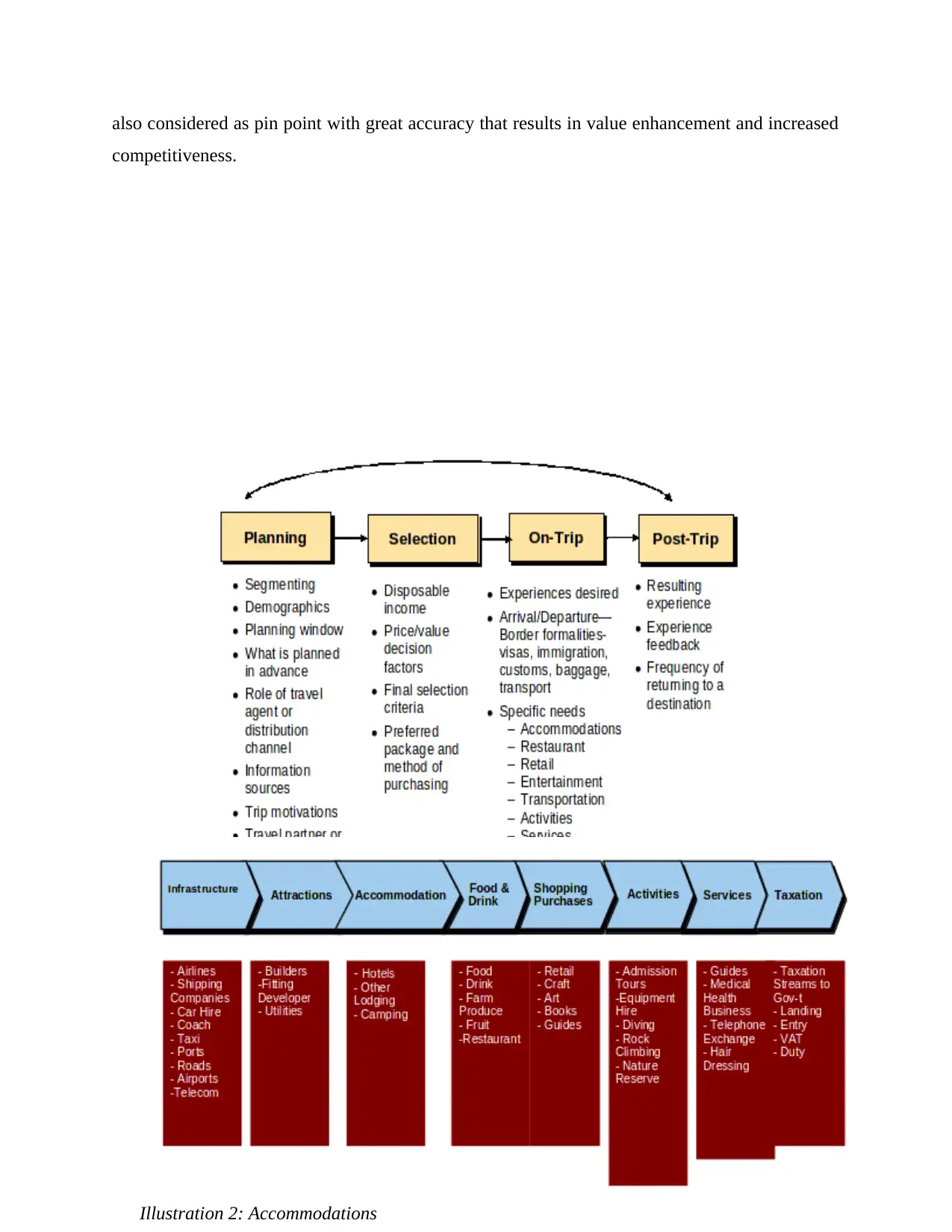
also considered as pin point with great accuracy that results in value enhancement and increased
competitiveness.
5
Illustration 1: Tourism value chain elements
Illustration 2: Accommodations
competitiveness.
5
Illustration 1: Tourism value chain elements
Illustration 2: Accommodations
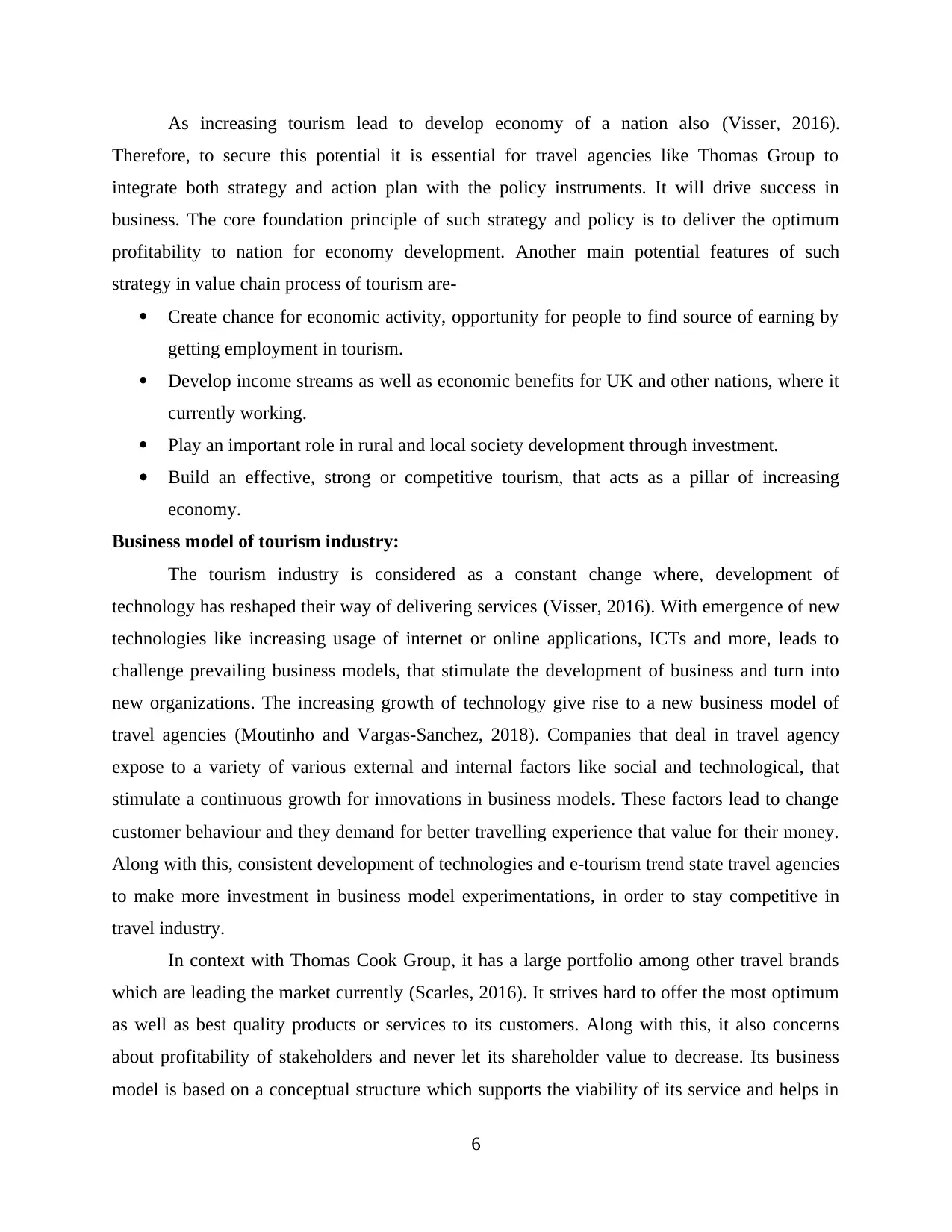
As increasing tourism lead to develop economy of a nation also (Visser, 2016).
Therefore, to secure this potential it is essential for travel agencies like Thomas Group to
integrate both strategy and action plan with the policy instruments. It will drive success in
business. The core foundation principle of such strategy and policy is to deliver the optimum
profitability to nation for economy development. Another main potential features of such
strategy in value chain process of tourism are-
Create chance for economic activity, opportunity for people to find source of earning by
getting employment in tourism.
Develop income streams as well as economic benefits for UK and other nations, where it
currently working.
Play an important role in rural and local society development through investment.
Build an effective, strong or competitive tourism, that acts as a pillar of increasing
economy.
Business model of tourism industry:
The tourism industry is considered as a constant change where, development of
technology has reshaped their way of delivering services (Visser, 2016). With emergence of new
technologies like increasing usage of internet or online applications, ICTs and more, leads to
challenge prevailing business models, that stimulate the development of business and turn into
new organizations. The increasing growth of technology give rise to a new business model of
travel agencies (Moutinho and Vargas-Sanchez, 2018). Companies that deal in travel agency
expose to a variety of various external and internal factors like social and technological, that
stimulate a continuous growth for innovations in business models. These factors lead to change
customer behaviour and they demand for better travelling experience that value for their money.
Along with this, consistent development of technologies and e-tourism trend state travel agencies
to make more investment in business model experimentations, in order to stay competitive in
travel industry.
In context with Thomas Cook Group, it has a large portfolio among other travel brands
which are leading the market currently (Scarles, 2016). It strives hard to offer the most optimum
as well as best quality products or services to its customers. Along with this, it also concerns
about profitability of stakeholders and never let its shareholder value to decrease. Its business
model is based on a conceptual structure which supports the viability of its service and helps in
6
Therefore, to secure this potential it is essential for travel agencies like Thomas Group to
integrate both strategy and action plan with the policy instruments. It will drive success in
business. The core foundation principle of such strategy and policy is to deliver the optimum
profitability to nation for economy development. Another main potential features of such
strategy in value chain process of tourism are-
Create chance for economic activity, opportunity for people to find source of earning by
getting employment in tourism.
Develop income streams as well as economic benefits for UK and other nations, where it
currently working.
Play an important role in rural and local society development through investment.
Build an effective, strong or competitive tourism, that acts as a pillar of increasing
economy.
Business model of tourism industry:
The tourism industry is considered as a constant change where, development of
technology has reshaped their way of delivering services (Visser, 2016). With emergence of new
technologies like increasing usage of internet or online applications, ICTs and more, leads to
challenge prevailing business models, that stimulate the development of business and turn into
new organizations. The increasing growth of technology give rise to a new business model of
travel agencies (Moutinho and Vargas-Sanchez, 2018). Companies that deal in travel agency
expose to a variety of various external and internal factors like social and technological, that
stimulate a continuous growth for innovations in business models. These factors lead to change
customer behaviour and they demand for better travelling experience that value for their money.
Along with this, consistent development of technologies and e-tourism trend state travel agencies
to make more investment in business model experimentations, in order to stay competitive in
travel industry.
In context with Thomas Cook Group, it has a large portfolio among other travel brands
which are leading the market currently (Scarles, 2016). It strives hard to offer the most optimum
as well as best quality products or services to its customers. Along with this, it also concerns
about profitability of stakeholders and never let its shareholder value to decrease. Its business
model is based on a conceptual structure which supports the viability of its service and helps in
6
⊘ This is a preview!⊘
Do you want full access?
Subscribe today to unlock all pages.

Trusted by 1+ million students worldwide
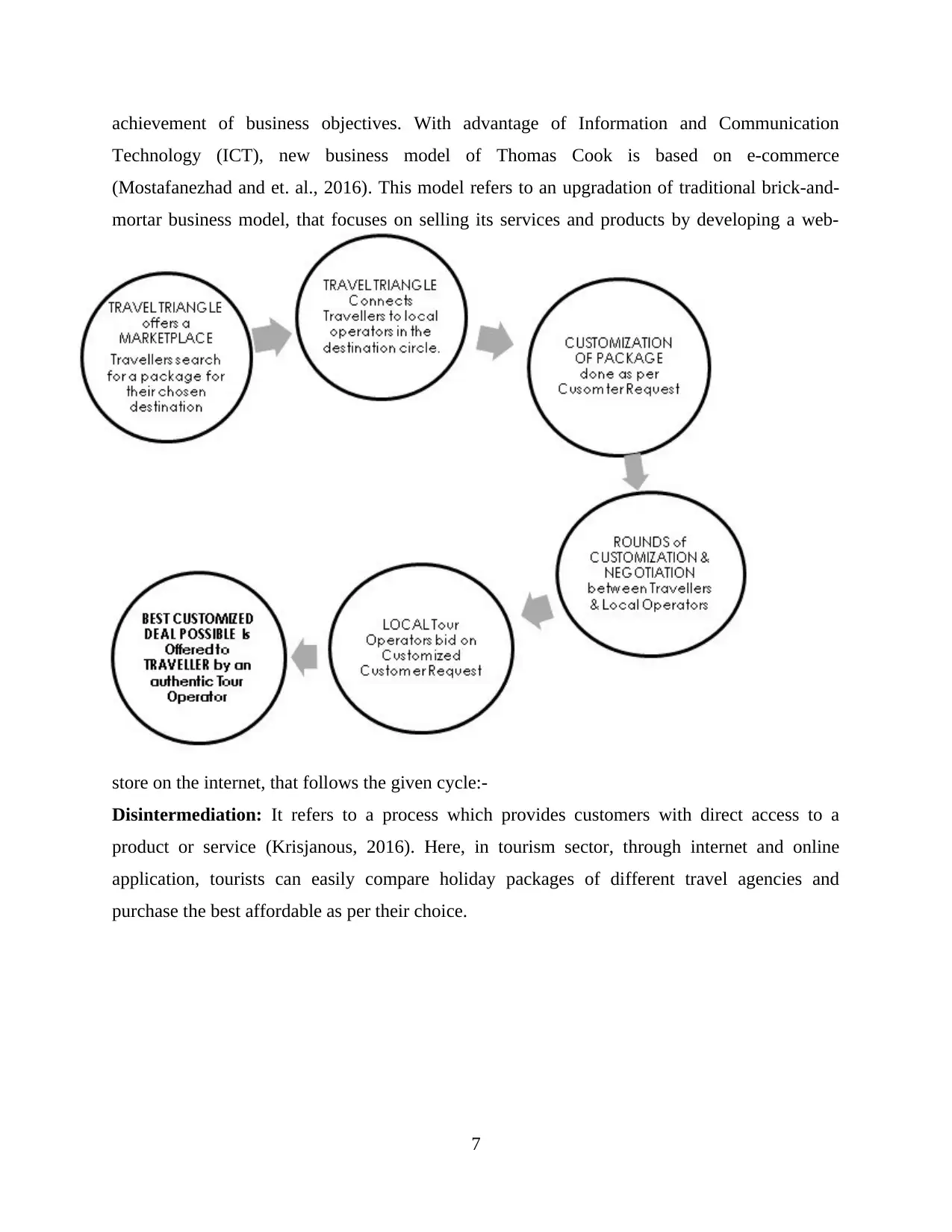
achievement of business objectives. With advantage of Information and Communication
Technology (ICT), new business model of Thomas Cook is based on e-commerce
(Mostafanezhad and et. al., 2016). This model refers to an upgradation of traditional brick-and-
mortar business model, that focuses on selling its services and products by developing a web-
store on the internet, that follows the given cycle:-
Disintermediation: It refers to a process which provides customers with direct access to a
product or service (Krisjanous, 2016). Here, in tourism sector, through internet and online
application, tourists can easily compare holiday packages of different travel agencies and
purchase the best affordable as per their choice.
7
Technology (ICT), new business model of Thomas Cook is based on e-commerce
(Mostafanezhad and et. al., 2016). This model refers to an upgradation of traditional brick-and-
mortar business model, that focuses on selling its services and products by developing a web-
store on the internet, that follows the given cycle:-
Disintermediation: It refers to a process which provides customers with direct access to a
product or service (Krisjanous, 2016). Here, in tourism sector, through internet and online
application, tourists can easily compare holiday packages of different travel agencies and
purchase the best affordable as per their choice.
7
Paraphrase This Document
Need a fresh take? Get an instant paraphrase of this document with our AI Paraphraser
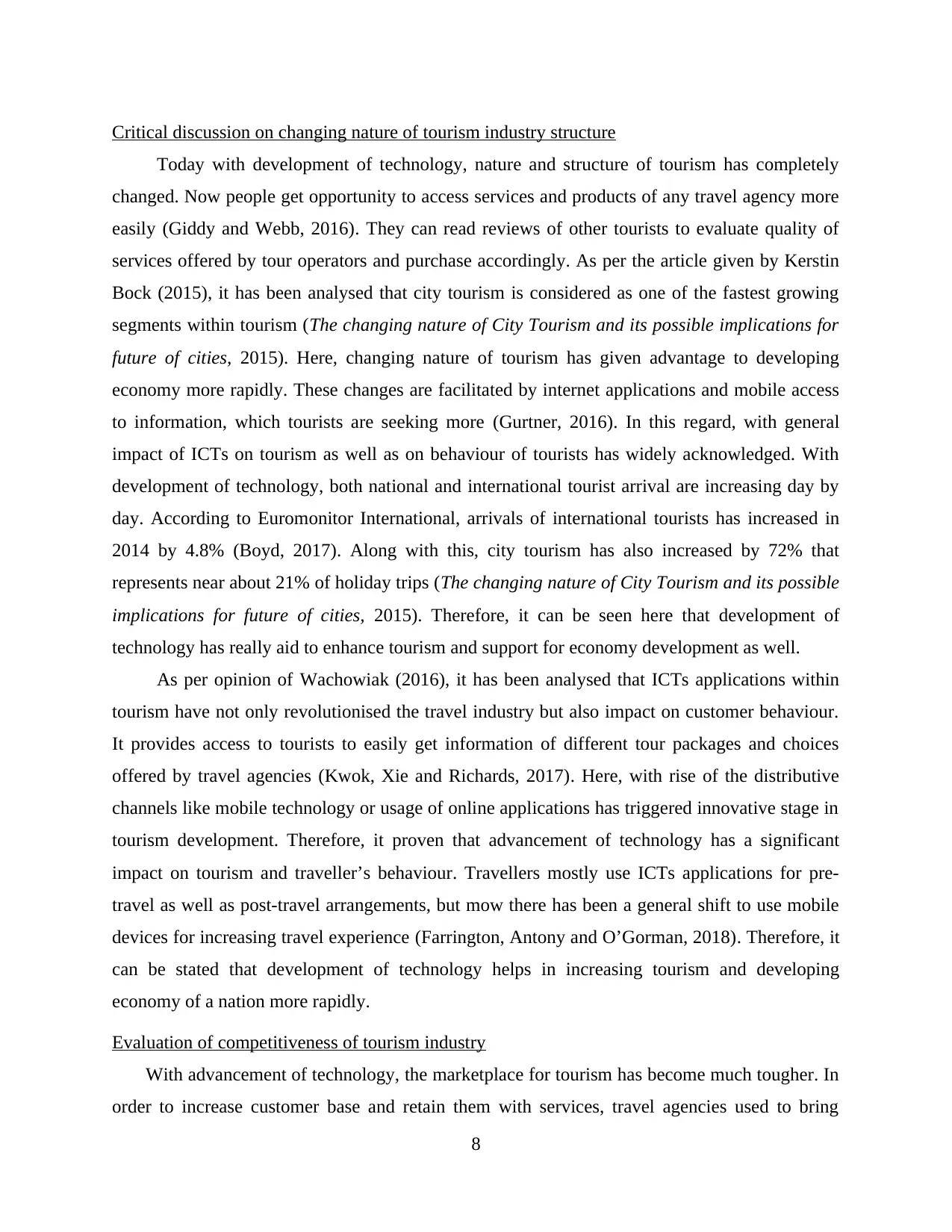
Critical discussion on changing nature of tourism industry structure
Today with development of technology, nature and structure of tourism has completely
changed. Now people get opportunity to access services and products of any travel agency more
easily (Giddy and Webb, 2016). They can read reviews of other tourists to evaluate quality of
services offered by tour operators and purchase accordingly. As per the article given by Kerstin
Bock (2015), it has been analysed that city tourism is considered as one of the fastest growing
segments within tourism (The changing nature of City Tourism and its possible implications for
future of cities, 2015). Here, changing nature of tourism has given advantage to developing
economy more rapidly. These changes are facilitated by internet applications and mobile access
to information, which tourists are seeking more (Gurtner, 2016). In this regard, with general
impact of ICTs on tourism as well as on behaviour of tourists has widely acknowledged. With
development of technology, both national and international tourist arrival are increasing day by
day. According to Euromonitor International, arrivals of international tourists has increased in
2014 by 4.8% (Boyd, 2017). Along with this, city tourism has also increased by 72% that
represents near about 21% of holiday trips (The changing nature of City Tourism and its possible
implications for future of cities, 2015). Therefore, it can be seen here that development of
technology has really aid to enhance tourism and support for economy development as well.
As per opinion of Wachowiak (2016), it has been analysed that ICTs applications within
tourism have not only revolutionised the travel industry but also impact on customer behaviour.
It provides access to tourists to easily get information of different tour packages and choices
offered by travel agencies (Kwok, Xie and Richards, 2017). Here, with rise of the distributive
channels like mobile technology or usage of online applications has triggered innovative stage in
tourism development. Therefore, it proven that advancement of technology has a significant
impact on tourism and traveller’s behaviour. Travellers mostly use ICTs applications for pre-
travel as well as post-travel arrangements, but mow there has been a general shift to use mobile
devices for increasing travel experience (Farrington, Antony and O’Gorman, 2018). Therefore, it
can be stated that development of technology helps in increasing tourism and developing
economy of a nation more rapidly.
Evaluation of competitiveness of tourism industry
With advancement of technology, the marketplace for tourism has become much tougher. In
order to increase customer base and retain them with services, travel agencies used to bring
8
Today with development of technology, nature and structure of tourism has completely
changed. Now people get opportunity to access services and products of any travel agency more
easily (Giddy and Webb, 2016). They can read reviews of other tourists to evaluate quality of
services offered by tour operators and purchase accordingly. As per the article given by Kerstin
Bock (2015), it has been analysed that city tourism is considered as one of the fastest growing
segments within tourism (The changing nature of City Tourism and its possible implications for
future of cities, 2015). Here, changing nature of tourism has given advantage to developing
economy more rapidly. These changes are facilitated by internet applications and mobile access
to information, which tourists are seeking more (Gurtner, 2016). In this regard, with general
impact of ICTs on tourism as well as on behaviour of tourists has widely acknowledged. With
development of technology, both national and international tourist arrival are increasing day by
day. According to Euromonitor International, arrivals of international tourists has increased in
2014 by 4.8% (Boyd, 2017). Along with this, city tourism has also increased by 72% that
represents near about 21% of holiday trips (The changing nature of City Tourism and its possible
implications for future of cities, 2015). Therefore, it can be seen here that development of
technology has really aid to enhance tourism and support for economy development as well.
As per opinion of Wachowiak (2016), it has been analysed that ICTs applications within
tourism have not only revolutionised the travel industry but also impact on customer behaviour.
It provides access to tourists to easily get information of different tour packages and choices
offered by travel agencies (Kwok, Xie and Richards, 2017). Here, with rise of the distributive
channels like mobile technology or usage of online applications has triggered innovative stage in
tourism development. Therefore, it proven that advancement of technology has a significant
impact on tourism and traveller’s behaviour. Travellers mostly use ICTs applications for pre-
travel as well as post-travel arrangements, but mow there has been a general shift to use mobile
devices for increasing travel experience (Farrington, Antony and O’Gorman, 2018). Therefore, it
can be stated that development of technology helps in increasing tourism and developing
economy of a nation more rapidly.
Evaluation of competitiveness of tourism industry
With advancement of technology, the marketplace for tourism has become much tougher. In
order to increase customer base and retain them with services, travel agencies used to bring
8
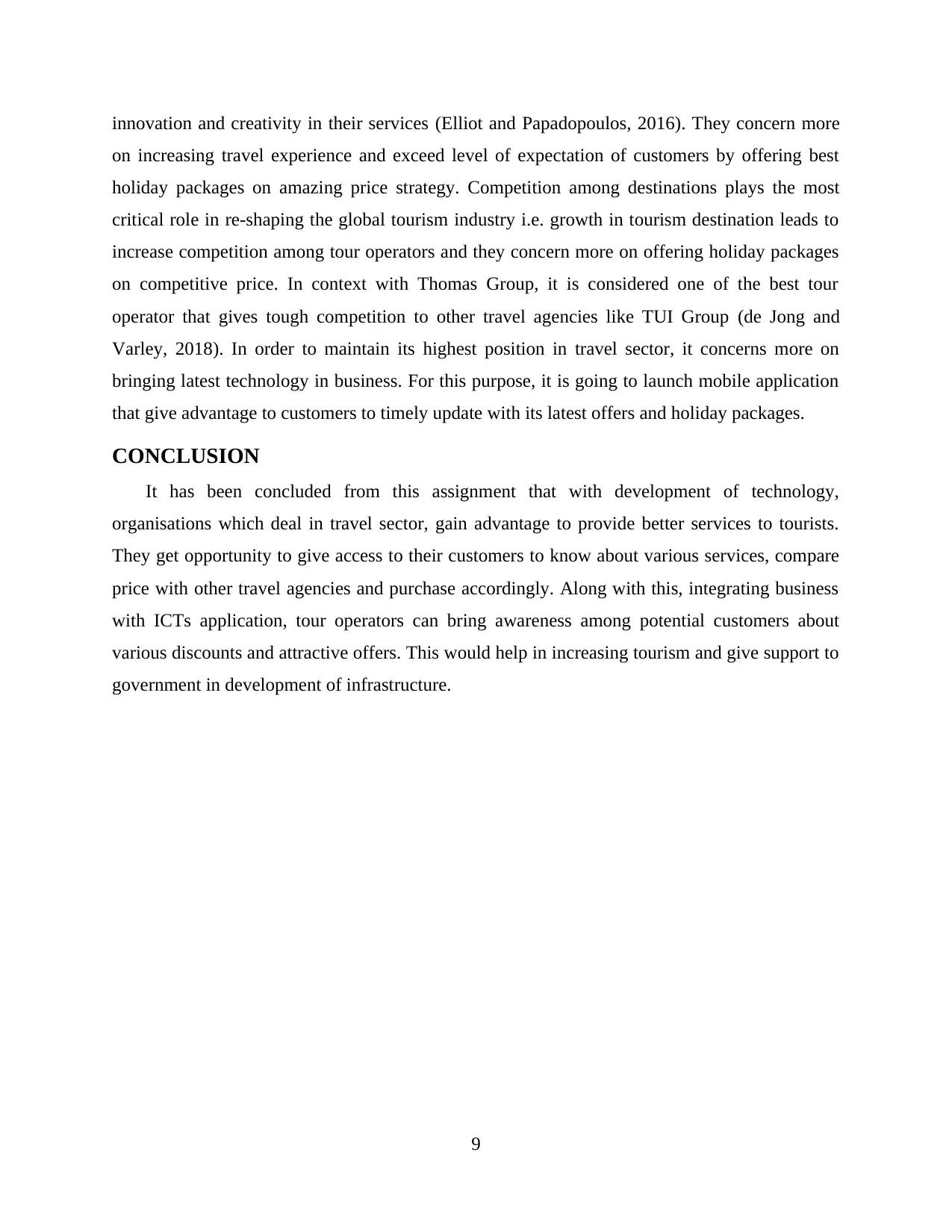
innovation and creativity in their services (Elliot and Papadopoulos, 2016). They concern more
on increasing travel experience and exceed level of expectation of customers by offering best
holiday packages on amazing price strategy. Competition among destinations plays the most
critical role in re-shaping the global tourism industry i.e. growth in tourism destination leads to
increase competition among tour operators and they concern more on offering holiday packages
on competitive price. In context with Thomas Group, it is considered one of the best tour
operator that gives tough competition to other travel agencies like TUI Group (de Jong and
Varley, 2018). In order to maintain its highest position in travel sector, it concerns more on
bringing latest technology in business. For this purpose, it is going to launch mobile application
that give advantage to customers to timely update with its latest offers and holiday packages.
CONCLUSION
It has been concluded from this assignment that with development of technology,
organisations which deal in travel sector, gain advantage to provide better services to tourists.
They get opportunity to give access to their customers to know about various services, compare
price with other travel agencies and purchase accordingly. Along with this, integrating business
with ICTs application, tour operators can bring awareness among potential customers about
various discounts and attractive offers. This would help in increasing tourism and give support to
government in development of infrastructure.
9
on increasing travel experience and exceed level of expectation of customers by offering best
holiday packages on amazing price strategy. Competition among destinations plays the most
critical role in re-shaping the global tourism industry i.e. growth in tourism destination leads to
increase competition among tour operators and they concern more on offering holiday packages
on competitive price. In context with Thomas Group, it is considered one of the best tour
operator that gives tough competition to other travel agencies like TUI Group (de Jong and
Varley, 2018). In order to maintain its highest position in travel sector, it concerns more on
bringing latest technology in business. For this purpose, it is going to launch mobile application
that give advantage to customers to timely update with its latest offers and holiday packages.
CONCLUSION
It has been concluded from this assignment that with development of technology,
organisations which deal in travel sector, gain advantage to provide better services to tourists.
They get opportunity to give access to their customers to know about various services, compare
price with other travel agencies and purchase accordingly. Along with this, integrating business
with ICTs application, tour operators can bring awareness among potential customers about
various discounts and attractive offers. This would help in increasing tourism and give support to
government in development of infrastructure.
9
⊘ This is a preview!⊘
Do you want full access?
Subscribe today to unlock all pages.

Trusted by 1+ million students worldwide
1 out of 14
Related Documents
Your All-in-One AI-Powered Toolkit for Academic Success.
+13062052269
info@desklib.com
Available 24*7 on WhatsApp / Email
![[object Object]](/_next/static/media/star-bottom.7253800d.svg)
Unlock your academic potential
Copyright © 2020–2026 A2Z Services. All Rights Reserved. Developed and managed by ZUCOL.




